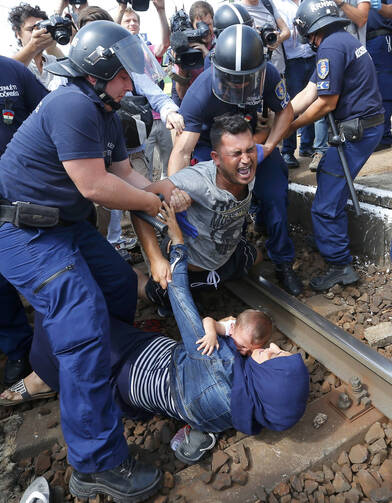What has been described as the worst refugee crisis since the end of World War II reached a crescendo this week as thousands of people fleeing Syria, Iraq and other Middle East calamity zones piled up at hastily erected barricades on the borders of Europe. But European sentiment that had been resisting the idea of accepting large numbers of Middle Eastern asylum seekers shifted abruptly with the publication of desolate images of drowning victim three-year-old Aylan Kurdi face down in the surf on a beach in Bodrum, Turkey.
Not far from his lifeless body were the bodies of his brother and mother and nine other victims of a disastrous attempt on Sept. 2 to reach sanctuary on the Greek island of Kos. Pictures of little Aylan provoked horror around the world and ignited a continent-wide examination of conscience that by the end of the day led to the apparent reversal of positions on refugee resettlement among E.U. leaders, including British Prime Minister David Cameron. The United Kingdom has so far accepted only a little over 200 Syrian refugees, but Cameron told reporters Great Britain would fulfill its “moral responsibilities to refugees” and now accept thousands more.
Dino Mujanović, country representative for Catholic Relief Services in Serbia, told America that C.R.S. has for weeks been responding to the crisis. (You can hear our interview below.) “At this moment there is a huge humanitarian failure in treating the refugee crisis,” he said. “Those numbers are increasing day by day, people are coming, desperate, exhausted, robbed on the way, seeking shelter in Western Europe.”
He estimates that most refugees, his preferred descriptive considering the circumstances of their flight, are coming from Syria, but also that many are emerging out of Iraq. “These are not economic migrants,” he stressed, noting the “strong” reasons many have to leave conflict zones in Syria and Iraq, escaping ISIS, the Assad regime or both.
They arrive at the Serbian border hungry, filthy and “super tired,” he said. Cut off because of their undocumented status from normal modes of transportation, he said, many have essentially walked across the continent. Most have spent months on the road; some even years as they accepted whatever work they could along the way to raise money to pay human traffickers to move them further along to their hoped-for refuge. These people are passing over continents, Mujanović said, an unprecedented passage. He implored European leaders, as well as people in the United States, to not close their eyes to this humanitarian catastrophe.
“They need help, they need shelter, they need respite and they need to return and repossess their dignity.
“We should all show the solidarity and act with compassion with and for these people,” he said. “I am afraid what will the winter bring and hope this will be handled properly. I mean that the influx will be at least decreased, if not stopped and that refugees will be sheltered adequately and in countries where they want to be. We do not want camps and we want them treated with respect and dignity—that is our human responsibility, as well as the legal obligation.”
C.R.S. officials report that the agency is scaling up its response to the crisis in the Balkans, working with its church partners in Greece, Albania, Macedonia and Serbia to provide immediate assistance, including food, water, access to sanitation, medical care and legal services.
C.R.S. is also calling on the United States to expand humanitarian assistance to countries in the Middle East, and Turkey, that have for years been sheltering the largest number of Syrians and Iraqis, as well as to countries burdened by this new migration. Most importantly, C.R.S. officials say the United States should lead concerted diplomatic efforts to end the fighting in Syria.
"Many Syrians have given up hope of returning home any time soon," said Bill O'Keefe, vice president for Government Relations and Advocacy at C.R.S. "Countries such as Jordan and Lebanon that have opened their doors to Syrian and Iraqi refugees are simply out of resources. And many countries in Southern Europe are not prepared to meet the growing needs of those moving onward."
European leaders plan to meet in mid-September to hash out a response to the crisis and Mujanović said he is hopeful that will come up with a comprehensive plan based on a shared commitment. The crisis has been hard on poor European states such as Serbia, he explained, which is only emerging itself from severe flooding that caused widespread devastation in the past year. Given the huge human press he is witnessing, Mujanović was not encouraged by the small numbers he has heard some European leaders express a willingness to accept for resettlement. He is hoping that more realistic figures will emerge during the summit discussion.
"The stories I have heard are horrible," said Mujanović, remembering one woman refugee who clung to one surviving child in a camp being served by C.R.S. She had been traveling with her husband and twins "who lost their lives between Turkey and the island of Kos." The woman simply pressed on alone into Europe with the remnant of her family, too afraid to remain behind even just long enough to bury her dead.








